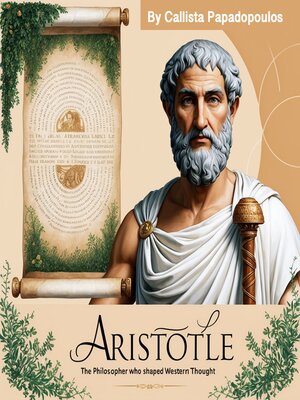Aristotle
audiobook (Unabridged) ∣ The Philosopher Who Shaped Western Thought
By Callista Papadopoulos

Sign up to save your library
With an OverDrive account, you can save your favorite libraries for at-a-glance information about availability. Find out more about OverDrive accounts.
Find this title in Libby, the library reading app by OverDrive.



Search for a digital library with this title
Title found at these libraries:
| Library Name | Distance |
|---|---|
| Loading... |
This audiobook is narrated by a digital voice.
In the northern Greek city of Stagira, in the year 384 BCE, a child was born who would become perhaps the most influential thinker in human history, whose ideas would shape intellectual discourse for over two millennia and whose systematic approach to knowledge would establish the very foundations of scientific inquiry. Aristotle entered a world already transformed by the philosophical revolution initiated by Socrates and developed by Plato, yet he would ultimately transcend his predecessors to create comprehensive systems of thought that encompassed every branch of human knowledge, from the practical arts of politics and ethics to the theoretical sciences of physics and metaphysics.
The circumstances of Aristotle's birth and early life provided him with unique advantages that would prove crucial to his intellectual development. His father, Nicomachus, served as court physician to Amyntas III, king of Macedonia, establishing a family connection to the Macedonian royal house that would profoundly influence Aristotle's later career. This medical heritage exposed the young philosopher to empirical observation and systematic investigation from an early age, instilling habits of careful attention to detail and evidence-based reasoning that would distinguish his approach from the more abstract speculations of many contemporary thinkers.
The political environment of fourth-century Greece provided the backdrop for Aristotle's intellectual formation, as the traditional city-state system gave way to larger kingdoms and imperial powers that required new forms of political organization and theoretical understanding.







